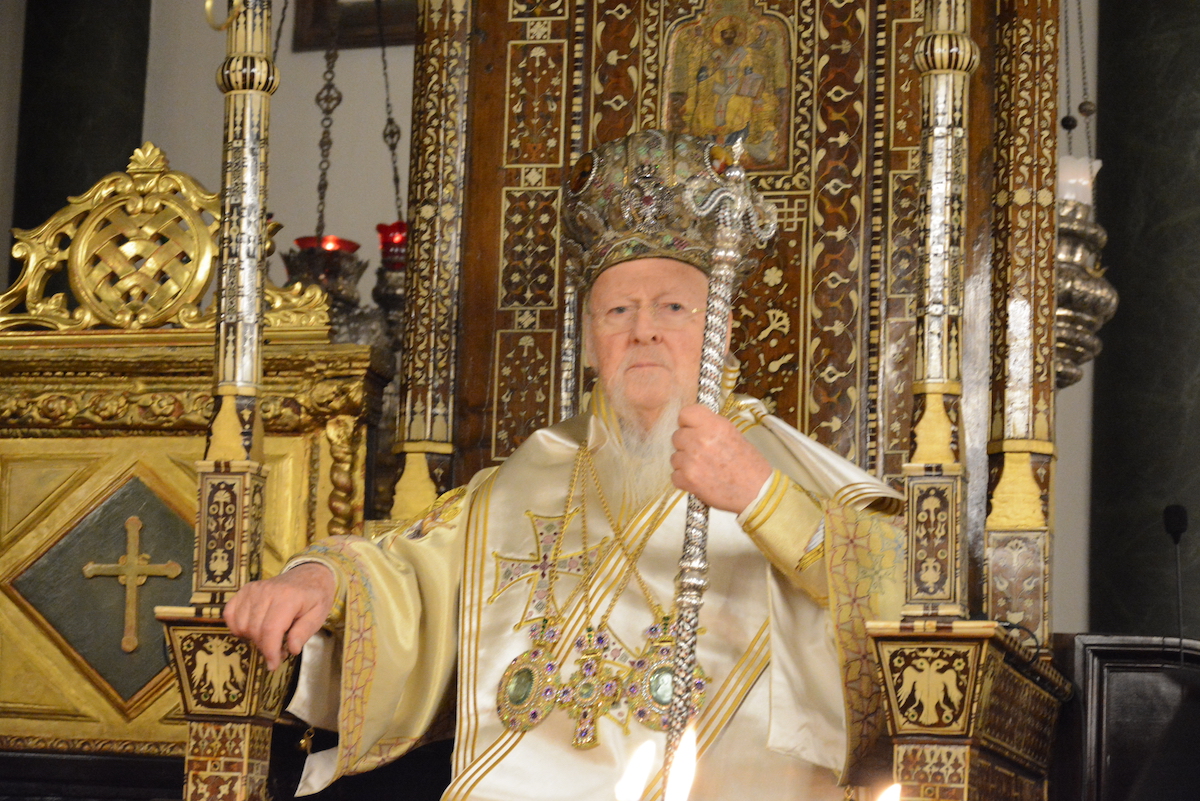
By God’s Mercy
Archbishop of Constantinople-New Rome and Ecumenical Patriarch
To the Plenitude of the Church:
May the Grace, Peace and Mercy of Christ Risen in Glory be with you All
Most honorable brother Hierarchs,
Dearly beloved children,
Having arrived with God’s grace at the all-saving Resurrection of the Lord, through which the power of death was abolished and the gates of paradise were opened to the entire human race, we address to all of you our paschal greetings and heartfelt wishes, as we proclaim the cry “Christ is Risen” that gives joy to the world.
In all of its dimensions, the life of the Church is invigorated by the ineffable joy of the Resurrection. The “experience of resurrection” is witnessed in the labors of the Saints and Martyrs of our faith, as well as in the liturgical and sacramental life, the proclamation of the Gospel “to the ends of the earth”, the devotion and spirituality of the faithful, their sacrificial love and Christian conduct, but also in their expectation of a world where “death will no longer exist, nor will there be mourning, wailing or suffering” (Rev. 21,4).
In and through the Resurrection, everything lies in a state of motion toward perfection in the Kingdom of God. This eschatological drive has always provided Orthodox Christians in the world with dynamism and perspective. Despite the claims of the opposite, as a result of the eschatological orientation of its life, the Church never compromised with the presence of evil in all its expressions in the world. Nor did it deny the reality of pain and death. Nor again did it ignore the ambiguity of human affairs. And finally, it never considered the struggle for a more just world as something foreign to its mission.
Still though, the Church always knew that pain and the cross are not the ultimate reality. The experiential quintessence of the Christian life is the conviction that, through the Cross and through the “narrow gate”, we are led to the Resurrection. This faith is reflected in the fact that the core of church life, the Divine Eucharist, is essentially linked with the Resurrection of Christ. In the Orthodox tradition, as the late Metropolitan John of Pergamon emphasizes, the Divine Eucharist “is filled with joy and light … because it is not grounded in the Cross and an idealization of passion, but in the Resurrection as the transcendence of the passion of the Cross”[1]. The Holy Eucharist transports us to Golgotha not so that we may remain there, but so that we may be led through the Cross to the ever-radiant glory of the Kingdom of God. The Orthodox faith is the overcoming of the utopian salvation “without the Cross” and of the existential shipwreck of the Cross “without the Resurrection”.
Our participation in the Resurrection of Christ through the sacrament of the Church is on the one hand a tangible abolition of every utopianism and of the false paradise promising unimpeded self-indulgence, while at the same time a definitive transcendence of hopeless self-enslavement in supposed unsurpassable negativity, because the Cross of Christ gives birth to the Resurrection, to the “endless delight”, to “the enjoyment of eternal glory”. The annihilation of death through the Cross and Resurrection of our Savior elevates our life to its divine-human essence and its heavenly destiny.
In Christ, we know and live that the present life is not our entire life, that our biological death does not constitute an end or obliteration of our existence. The biological boundaries of life do not define its truth. After all, the sense that life is an irreversible “journey toward death” leads to existential impasses, to depression and nihilism, to indifference for what truly matters in life. Science, and financial or social progress are unable to offer an essential solution or outlet. Christians are “those who have hope” (1Thess. 4,13), who expect the coming Kingdom of the Father and Son and Holy Spirit as a final reality, as the fullness of life and knowledge, as the fulfilment of joy, not only for the coming generations but for the entire human race from the beginning to the end of the ages.
This vision of history and eternity, the resurrectional nature of Orthodox faith, ethos and culture—namely, the unquestionable fact that the great miracle of Truth is only revealed “to those who venerate the mystery in faith”—is what we are called to witness today within a civilization that rejects the Transcendent and in the context of manifold reductions of the spiritual identity of human existence.
We give glory in chant, hymn and spiritual song to the Lord who rose from the dead and shines eternal life upon all. We participate with joy in “the feast that is common to all”. And we beseech the all-powerful, all-wise and all-merciful Maker and Redeemer of all to bring peace to the world and grant all His saving gifts to humankind, so that His all-honorable and majestic name may be glorified and blessed, now and always and to the ages of ages. Amen!
At the Phanar, Holy Pascha 2023
+ Bartholomew of Constantinople
Fervent supplicant for you all
to the Risen Lord
_____________
[1] See his Eschatology and History: Works 1: Ecclesiological Studies (Athens: Domos Books, 2016), 498.
_______
photo: Nikos Papachristou / Ecumenical Patriarchate

Δεν υπάρχουν σχόλια:
Δημοσίευση σχολίου
Σημείωση: Μόνο ένα μέλος αυτού του ιστολογίου μπορεί να αναρτήσει σχόλιο.